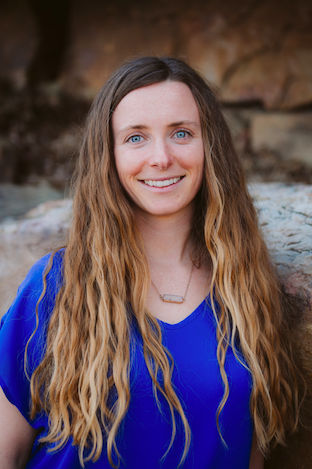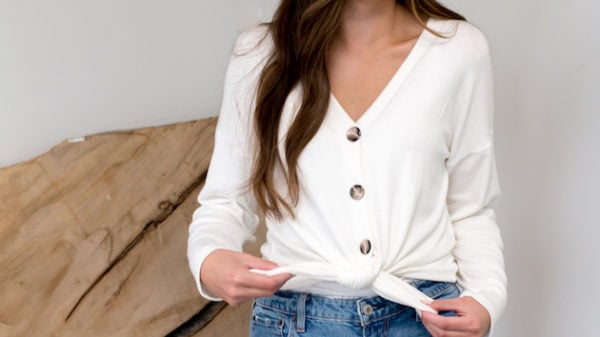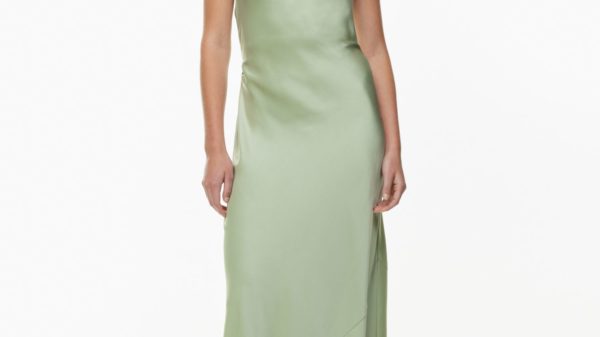
Source: Jordan Green
On this week’s Let’s Talk About… episode, Elise sits down with relationship therapist Jordan Green.
Jordan Green is a licensed social worker and founder and CEO of Remble. She’s on a mission to make the world a better place by empowering people to be their healthiest selves.
Elise and Jordan talk about interdependence in a relationship, how to focus on yourself, communicating, and dealing with conflict with your partner.
“I think even in a relationship, it’s so healthy to spend time apart. I think a really vital part of building and maintaining a healthy relationship is maintaining a sense of individuality and, a good solid relationship with yourself within a relationship.” Jordan tells Elise on Let’s Talk About.
Check out the show transcript below.
[00:00:00] Elise: Hi everyone and welcome. Today let’s talk about building lasting relationships with Jordan Green. Jordan is a licensed social worker and founder and CEO of Rumble. She’s on a mission to make the world a better place by empowering people to be their healthiest selves.
Jordan, thanks so much for being here with us today.
[00:00:17] Jordan: Thank you so much for having me. I’m really excited to be here and to talk with you and to share more about what I’m doing and. About building happy and healthy lasting relationships. Yeah. Well,
[00:00:27] Elise: I’m thrilled to have you cuz I feel like I, in talk conversations with many of my friends, we’re all kind of at that, we’re all at different stages in relationships, but in, in terms of romantic relationships.
But I think you also talk about that relationship with yourself. So I feel like we’re gonna cover probably quite a bit today. But why don’t we start with how you got into this field.
[00:00:50] Jordan: That’s a great question. So I am started doing therapy, oh gosh, maybe five years ago. I’m trying to remember how long it’s been, but I’ve been doing therapy for a little while and I loved doing it.
I loved seeing clients. I worked with individuals, I worked with couples, I worked with families and, um, got to see a good broad range of people who were struggling with different types of things. And it gave me a really good foundation. I realized I loved working with couples and, um, working with people on building relationships and improving their relationships and But I realized that I was only able to see a few people at a time doing one to one therapy, and I wanted to reach and help more people.
I felt like I had all of this knowledge from education in years of helping people and um, I wanted to do more. So that led me to create a therapy Instagram account in November of 2019. And I started posting educational content, um, on all kinds of mental health topics. And I noticed that the relationship posts would do like four or five times better than any other topic.
People were just hungry for this content on relationship. So, um, I started posting more relationship content and my account grew really quickly to about a quarter of a million followers, and I started getting dozens of messages in my dms every week. People who are struggling with their mental health are struggling with their relationships, and they were asking for advice and for help.
And, um, as a therapist, I can’t give free advice in my Instagram dms, but I would encourage people to find a therapist to talk to and I would hear so many times over and over again that people couldn’t afford therapy or it wasn’t accessible to them where they were in the world. Or for a lot of people, they may, even if they could see a therapist, there were long waits for treatment or they didn’t wanna see a therapist because of the, some, something related to the stigma around mental illness. Maybe they were worried about their family finding out and, um, but people were asking for content so that they could help themselves. And I realized that there was a huge demand here and, um, that people were needing.
This type of therapeutic information, um, delivered in a little bit of a different way than it has been before. So I had this vision of bringing a bunch of different therapists under one app to create content and provide education and resources on. This, this information that we as therapists know, because we’ve gone to school for this, we’ve done all of these trainings, but it’s largely still not accessible to the public where you have to go, it’s, it’s fragmented.
You have to search on Google or read a bunch of different books to gather this, this sort of information. So I had a vision of bringing it all under one app and making it accessible to everyone. So that’s how Remble was born. We started, I building Remble and um, partnered with one of the, the largest mental health publishing companies for content.
I partnered with over 30 different therapists for content and we just launched Rumble, um, at the very end of July. And so I’m really excited to finally, for this to be here and to be sharing it with the world and. We have so many courses on the app. We have over 50 courses, um, on relationships and mental health.
We have these TikTok style videos all created by therapists with daily tips and ideas and practices. And then we have a, another section of the app that’s, um, focused on building a healthy relationship with yourself, where we have coping skill videos and meditations and. And affirmations and journaling and, um, one of the most popular features is relationship conversation questions with hundreds of questions, um, by category that you and your partner or a friend can go through to just start conversations, um, and to talk about.
There’s always something new to discover, whether it’s with your partner or family members. So that’s been a, it’s a really fun feature that people are loving.
[00:04:30] Elise: What an amazing tool, because you’re right, I think that therapy. I mean there’s, it’s not accessible number one to everyone. Like I only re like in the last couple years, found it more accessible and, and started seeing a therapist, et cetera.
Um, but to have all those tools, cause it’s really not just the therapy part to your point, like the sound and the meditation and, and that kind of healing piece of it. And healing yourself part too is really like what the therapist starts with you on. Like even if, if you go, if you go saying, you know, I have this broken.
Relationship. What kind of, what, At least in my experience, what it led to was like, okay, what are your own issues? Right? So I love that, that that, that this app has that, that kind of space for the focus on yourself first. So, and maybe that’s a, a great place to start, right? Cause, you know, we’re here today to talk about like, building those lasting relationships, but it does really start with you as an individual.
And I know that, you know, you are a big proponent of that, that focus on yourself. Can you tell us a little bit more about.
[00:05:33] Jordan: Yeah, of course. And I think one of the first things I want to mention is that, uh, I encourage everyone to see a therapist if you can. Um, but I have a lot of therapists that use the app and refer their clients, um, to rumble because these resources are available 24/7 on demand, right when you need it.
Um, and. It’s great to see a therapist. It can be so, so, so helpful. And what do you do the other six and a half days a week when your therapist isn’t, It’s a good, what was that? What was that communication tool or that coping skill that they told me to use when I was really overwhelming? Um, so, so, um, yes, so really healthy relationship with yourself.
Um, I, I think it’s. That’s the foundation for a healthy relationship with another person, right? Because if we’re not, and not that we have to be totally happy and healthy and healed and in love with ourself to have a healthy and happy relationship. I think that’s a trap that we can get into is, uh, thinking I’m not ready for a relationship because I still have childhood trauma I’ve worked through, or because I don’t totally love myself.
Um, because a relationship can be a great. Place to work on healing some of the past stuff that you’ve experienced, those past patterns and traumas. It can be a great, um, space in which you have the support and the love and care that you need to also learn to love yourself better. But of course, I’m a huge advocate for building a healthy relationship with yourself because I think that’s a foundation for everything else.
And I think, even in a relationship, it’s so healthy to spend time apart. Um, and I think a really vital part of building a and maintaining a healthy relationship is maintaining a sense of individuality, um, and a and a good solid relationship with yourself within a relationship. In all relationships we have, I see kind of the spectrum of independence and dependent.
And in the middle is what we call interdependence. And that interdependence requires two whole people who are able to function independently. But they’re also able to depend on their partner in a healthy way. But in order to do that without losing yourself, there needs to be that healthy sense of self and that, um, that sense of independence as well.
[00:07:45] Elise: I love that you said, um, I think often we talk about, or, and I don’t know if this is just me and my experience, but that talk about like, you need to be independent and, and be your full self, but I love that you all said you also need to be able to be dependent. Right? So can you, I don’t know if, and maybe I’m wrong, but do you feel like that ability to be dependent gets talked about as much as.
Focus on being independent, or is that just my own personal experience and lens that I’m putting on?
[00:08:15] Jordan: Yeah, I think that in the West we tend to have this, hyper focus on individuality and independence and, I’ve noticed when I’ve, when I’ve traveled the world and learned more about other cultures, that that’s not always the case and other cultures that this sense of culture and the community and dependence upon one another is actually celebrated and encouraged.
And so, I think like maintaining a healthy sense of individual identity and self-esteem, but accepting your differences is key. Um, and when we’re able to depend on others, attachment is normal. It’s normal to be attached, to have a healthy attachment in relationships. I think I, I hear this idea that like, don’t get too attached or Don’t be attached because you may lose them eventually and then it hurts more, but mm-hmm.
I think when you, when there’s a healthy sense of dependence or this interdependence in a relationship, but it actually allows for more closeness and intimacy in the relationship. And, um, and so, I, I think when you, if, if you find yourself tending to be more independent or more avoidant in relationships, you can try to work on, depending on others in small ways, like asking for support with something small.
Um, building trust, learning to be a little bit more vulnerable with people who are actually safe and allowing for more of that intimacy and connection. Um, while also respecting your need for space at times. And so if you find yourself having trouble depending on others, um, it can be helpful to learn to build that trust by being vulnerable and accepting support and asking for help in small ways and recognizing it’s okay to depend on others, but um, in order to not lose yourself in you also have to know yourself. Know your likes and your dislikes and your values and goals and and practice expressing your opinions and desires and asking for what you want, and setting and maintaining healthy boundaries and having goals for yourself and working towards them and knowing your priorities and communicating them, and taking time for self care and to focus on yourself and to have your own hobbies and spending that time by yourself and taking that quality space apart.
So there’s definitely a balance to be found. , Um, it’s okay to be somewhat dependent on another person. Um, as long as you’re still maintaining that sense of individuality and independence. Um, you there, there’s a healthy balance to be found. I guess that’s
[00:10:38] Elise: really like related then to attachment theory, cuz you mentioned like avoidant.
Is that, is, is that kind of what you’re
[00:10:44] Jordan: speaking to right now? Yeah, yeah. So there are different attachment styles and avoidant is one of them. And that would be more on the, the spectrum, on the side of the spectrum of um, in. Where you’re, there’s like this hyper independence. I’m not going to depend on anyone.
I, um, can do it all by myself and it doesn’t maybe feel safe to get too close to someone. And then on the other end of the spectrum, we have more of an anxious attachment. And that’s where there’s this like, a, tends to be a lot of dependent, um, on another person. And, um, there can be people who have an anxious attachment tend to be labeled as needy or, um, or like more insecure in certain ways, but, Oftentimes, I always encourage like self-compassion, of course, because there’s a reason why we have the attachment styles that we do, but anxious would be more of the dependent side of the spectrum, and then more interdependent would be more of a secure attachment style.
[00:11:42] Elise: Mm-hmm. , I remind, you’re jogging my memory from the book. It’s attached right?
[00:11:46] Jordan: Yeah, attached. Yeah. Yeah.
Anyone wants to, Yeah. He lays out attachment styles in such a, such a clear way. It’s, that’s a great place to start. If you want to learn about attachment style attached by, um, I think it’s Amir Levine.
Trying to find it. What? In my bookcase, .
[00:12:05] Elise: I have it. It’s funny, I have it in my bookcase too, but I can’t see my bookcase from this angle. But no, that was, Yeah, for someone interested in a, in attachment theory, it, you’re right, it really kind of clearly lays it out. Um, Yeah. Yeah.
[00:12:17] Jordan: That’s the one. Yeah. Marilyn Levine.
[00:12:19] Elise: Yeah. And I feel. I didn’t even realize I was, um, one of that, that style. I didn’t even kind of bucket it. But as you bucket it in that way, you’re like, Oh yeah, okay. That makes a lot more sense. So for someone that’s, you know, doing that, maybe not in a relationship yet, but is doing on that focus on your self part, what kind of resources?
Like for me, that book was great. For me, Logan Yuri’s book and we’ve had her on the podcast as well, was wonderful. Is there certain, I think how. How not to die alone, I wanna say was her. Yeah. Have to. I have it in my bookcase too. But is there any other resources that you would recommend? Cause for me, you know, listening to podcasts, reading books, those were kind of, and going to therapy, those were kind of the things that led me on this, or at least caused me to focus on myself and my own kind of ways of working, I guess, and how I operated in relationships.
[00:13:15] Jordan: Mm-hmm. I think one of the biggest things that I would recommend is just spending time alone, spending time on your own, um, turning off technology without distractions. What, what do you do? And there’s nothing else. Like, there’s no one to talk to. There’s no one else influencing you. There isn’t, you know, your phone or TV or computer to turn to for distraction.
What comes up when you’re alone and when you’re just in that space and you give yourself time and space to, um, maybe you decide you wanna take a bath or to cook a nice meal for yourself or to return on music and dance, or just lay down and feel your body and, um, get familiar with your mind when there aren’t those distractions.
Or take yourself on a date and do something fun by yourself. And I think, um, The, the books and the podcast and all of that is great, but I think ultimately the best thing that you can do to build a relationship with yourself is just to spend time. With yourself, tuning in, listening to yourself. What do I need right now?
Um, what am I feeling? I think a lot of times we, we, we get so distracted and so busy in our lives that we don’t slow down for even just a few minutes to check in with ourself. How’s my body doing? Am I feeling tired? Am I a little bit hungry right now? Am I hot? Do I need to move my body and go for a walk or, um, How is, how am I doing mentally?
Am I feeling stressed or overwhelmed? Am I feeling, um, what do I need mentally right now? What do I need emotionally? What am I feeling emotionally? And just checking in with ourselves on those different, all of those different levels. And once we have that awareness, then we can give ourselves what we need.
Maybe it is some more time for rest. Maybe it’s more movement. Maybe we’re feeling lonely and we need to find ways to connect more socially with friends. Um, taking that time for yourself.
[00:15:08] Elise: I love that I think, great first step. , I mean, and whether you’re in a relationship or not really. Like even if you’re not, or even if you are right, I feel like now you, you got me thinking after this.
I wanna take, take five minutes and just lie there and kind of see what, what, what my body’s telling me I need. It’s very like, intuitive, right? Like mm-hmm. , what do I kind of feel? So, I don’t know. I love that. And that, so that focus on yourself. Let’s, and now you’re, let’s say, you know, All, all the stars have aligned and you found a person anyway.
What are those, you mentioned, you know, in the past you’ve done seminars, things on, on 10, 12 keys, successful, 12 keys to successful relationship, things like that. What are some of those building blocks that you can start putting in place, let’s say, in your first year of a relationship, um, to get those good habits developed?
[00:15:58] Jordan: Yeah, that’s a great question. I think, um, one simple thing that you can do to build a healthy relationship, and this is something that actually the Gottman Institute has done research on with hundreds and thousands of couples and. Um, they can tell within just a few minutes of observing a couple, whether that couple will be separated or will stay together, um, within a few years.
And one of the biggest indicators that they’ve found, thats the success of a relationship. Is whether people turn, couples turn towards or away from what they call bids for affection. So a or bids for connection. So a bid for connection is, um, just an attempt to get your partner’s attention and they can be verbal, like, um, making a comment or asking a question or sharing an observation or how you’re feeling.
Or they can be nonverbal, like reaching out to touch your partner, sitting next to them, or, um, pointing at something or making a playful gesture. And so the. The hidden message behind any bid for connection is, I wanna connect with you. Please give me your attention. And couples who they found, couples who separate turn, um, who separate, only turn towards.
Each other about a third of the time. Whereas couples that actually stayed together long term will turn towards each other about two thirds of the time, um, or like 86% of the time. So more than twos. Okay. And so the idea is that how you respond to your partner in those little moments when they’re reaching out for your attention and connection is super, super vital in a relationship.
So one of the things that you can do at the beginning of a relationship is notice it’s easier at the beginning of a relationship to turn towards your partner when they’re making attention. Um, but in turning towards may look like making eye contact or responding verbally, um, giving them your full attention, but then turning away may look like just ignoring them.
Maybe not looking at, maybe you’re looking down at your phone and your partner says something to you and, um, you don’t look up or you know, you’re at dinner and you’re sitting on your phones. How often do you go to a restaurant and you look around and you see people sitting on their phones rather than.
Being present with each other and giving each other their attention. And so I think there are little things that we can do in the beginning of a relationship to start to build these healthy habits of, um, being present with one another and connecting and taking time to get curious about, um, what’s going on in your partner’s world.
And, um, And just making an effort to turn towards them. And then there are, there are a lot of other little things that you can do in a relationship that are really fun, like creating, um, always encourage, creating daily rituals of connection. So starting to build those habits at the beginning of a relationship that help you to stay connected over time.
Because in the beginning it’s really easy to connect in those small moments, but, Over time in a relationship, I found that you have to be more intentional about it. So it’s the small things. It’s not that you have to do anything big or grand, um, but paying attention to those little moments that really do add up over time.
And, um, so an example of a small ritual of connection that you could create in your relationship is, um, is paying attention to how you greet one another after time apart, or how you say goodbye when one of one or both of you leaves for some time. And that really sets the tone between me and you. And when you do it right, it becomes something that you both subconsciously end up looking, uh, looking forward to each time you leave and each time you come together.
And that really, these little moments help to build intimacy and that emotional security and relationship. So when you say goodbye to your partner, do you look at them in the eyes and give them a, like a really big full body hug and, and tell them that you love them? Um, maybe you make a habit of doing that every time you say goodbye every time you leave.
Um, Think about I, I always like to think about. Like a dog’s reaction when their owner comes home and how, Oh, like the way that they’re, and I dunno
[00:19:47] Elise: if I could talk that .
[00:19:49] Jordan: Um, but like, I, I like to think about like, do you can you greet your partner like with as much excitement and joy as a dog would, and how much more is your partner going to look forward to seeing you every time, you know, after time apart if you greet one another in that way and, um, you teach, you teach them like, you’ll rub off on them because they’ll start getting excited too.
And, um, And so it’s just these little moments. It’s the little things that you can do. Another one, another ritual connection that you can create is just checking in before bed. Even if you’re doing long distance relationship, check in before bed. Um, see, ask them about their day. Ask what their favorite part of their day was, um, if there’s been something that has been stressing them out.
Lately about work or something else, ask them about it and just make an effort to listen, to just take a few minutes at the end of the day to really listen to them and show them that you care. And, um, and so you can do that whether you’re physically together or in a long distance relationship or just starting to date.
But I think like the main point I’m trying to make is just creating habits and routines of connection throughout the day in your relationship. It takes a little bit of. Extra effort at first, but it’s a great thing that you can do at the beginning of a relationship to build a solid foundation moving forward.
And it’s a great thing you can start doing if you’ve been in a relationship for a while. Um, and eventually it becomes habit. A habit. You don’t even have to think about it, but you’ll be connecting more and more throughout your days. And it’s those little moments that really do add up over time and make a huge difference.
[00:21:15] Elise: I love that you talk about those little moments, like those micro moments and how they are really what build a relationship, right? Like I think so often we’re in this world of like, you know, you see the beautiful moment on Instagram, but the reality is it’s like, how are you cooking dinner together? How are, like you mentioned, how are you greeting the person?
So I feel like that that gets lost sometimes in the way we, we present our relationships anyway. Right. Um, and I also, and I’d love to dive a little more into. I love how you also said like what you could do in it will, it will then likely rub off on your partner, right? So like I think often we think, what do I need from them?
But you talk a lot about, you know, what am I giving? And then I’ll probably receive that back. Can you, can you talk a little bit more about that? Like how really we can focus on, comes down to, I’d imagine we can focus on our own behavior. We can’t dictate how that other person behaves, right?
[00:22:10] Jordan: Yeah. I think, um, the ideas that you, you be the partner that you want to date, like be the partner that you want to have in a relationship.
And if you are focusing on being that person, um, you teach others how to treat you, you teach others. Um, You’re, you’re going to have a certain standard if you are being the type of partner that you want to have in a relationship, you, you are setting certain standards and expectations in the relationship for how they will treat you.
And, um, you’re also showing them how you want to be treated and, The idea of positive reinforcement. You hear that a lot with kids and parenting, but it works in relationships too. It’s, it’s totally relevant in relationships. Mm-hmm. , when your partner does something that you want to see more of, um, acknowledge it.
Give them, show them appreciation for what they’re doing and, um, give them a compliment or whatever it is that you can do to positively reinforce that behavior. Let them know how much you appreciate it, and, They are so much more likely to do more of that. Mm-hmm. , um, you definitely will highly influence your partner.
And so if you want something to change, work on making that change yourself and showing up in that way. And then again, it’s also okay to just. Be direct and ask for it. Like I would love for to, to get a hug from you every time you come home, um, before you go and check the news or whatever else you typically do.
Like, can we just take a moment to connect every time you come home and not being afraid to just verbally ask for what you want? A lot of times we wish our partners could just read our minds and would know what we want, um, and so we can. Demonstrate what we want, um, by being that example and, and by living it, but we can also communicate it through our words and ask directly for what we want.
And, um, sometimes we just have to be really specific. Uh, I think sometimes we think that we’ve communicated what we want, but it doesn’t really, it doesn’t really land, um, with our partners. And sometimes it’s just that they need us to be. A lot more specific so they know exactly how we’re wanting to receive whatever it is that we’re wanting to receive.
Um, and that sets them up for success because, uh, you’re telling them exactly what you want and then of course your partner is going to want to make you happy and to meet your needs and to help you feel loved. And so, um, think about how can you best set them up for success in giving you what you want?
And one of the best ways to do that is just to be direct about it and to be spec very, very specific about what you’re want.
[00:24:46] Elise: Yeah, I love that. Yeah. Specific, not in, not, um, sometimes I do this myself a lot, like, I think I’m being specific through my words, but like, they’re not the way they’re received in terms of like, and that could be not even in romantic relationships, just even in work, right?
Like sometimes we think we’re maybe communicating in a clear way, but we’re not. We’re not .
[00:25:08] Jordan: Yeah, exactly. Like an example would be, Hey, can you help clean, like keep the house clean? Great. They may think that that means them picking up their shoes and their clothes, but you are really meaning, will you help with the dishes?
Will you help suit the floor? Um, right. Wipe down the bathroom sink. And then they’re thinking that they’re helping to keep the house clean because they’ve picked up their clothes. Not doing anything, and there’s just a total miscommunication there. And so being more specific, you know, trash days on Thursdays, can we, you know, are you, can you start taking a trash out on Wednesdays or can you help with the dishes, um, after dinner or whatever it is.
Just being more specific says both of you up for success. That way you’re not feeling resentful or feeling like they’re. You’ve asked for it, but they’re not actually helping to meet those needs that you have. Um, and they then know is exactly what they need to do. Mm-hmm. .
[00:25:57] Elise: Yeah. I love that. I think that’s a, a very valid point.
And I know what, you know, we kind of started this part of the, the chat off anyway and building good habits in a new relationship. But what if you have some of those, you know, what if you’re 10 years in, 20 years in, you have some of those bad habit. How do you or habits, good or bad, how do you kind of reverse that?
Is that, is that by just doing what you’ve said too? Like being specific and or is there, is there a different psychology behind, you know, if you’ve been in that relationship for 10 plus years now?
[00:26:29] Jordan: Yeah, I think, you know, if you’ve built a lot, um, if you’ve kind of accumulated some bad habits, throughout a relationship mm-hmm.
um, something that I encourage couples to do is to, um, have an initial meeting about the things that you want to change. And this can be great to do in therapy with the support of a couple’s therapist or a coach to help facilitate this process. Um, but to have just that candid and frank and open conversation.
What’s not working? What do we want to change? And then creating a plan for how that can happen. And, um, and so I encourage that couples initially to do weekly check-in meetings, um, or eventually, you know, sometimes it can become biweekly or monthly. But, um, that. Check in meeting creates the space for you to talk about what’s going on, to listen to each other, um, and it helps you to catch problems early on, which means less tension and conflict overall.
But it helps. It also helps if you’ve been in a relationship for a long time. Um, it gives you a space to talk about those hard things that you may not want to bring up throughout the week because you’re worried it will create conflict. It gives you time to mentally prepare to have those conversations because you know it’s happening on a certain day of the week at a certain time.
Um, and it, and it’s. It, you know, helps you to catch those small issues and areas of improvement before they snowball into bigger problems. But if it is a bigger problem, you know, if there are bigger problems right now in the relationship, um, the relationship check-in means a great time and place to talk about that.
Mm-hmm. . And so, um, I have kind of like a formula for relationship check-in meetings and, you know, always starting with, with. Appreciation, expressing appreciation for your partner, including things that you noticed them do that week that you’re really grateful for. Complimenting them, um, for the good that is there and the, the positive changes that they’ve made that week.
And then acknowledging what’s going well, the progress that you’re making. It, it’s, it can be really tempting, especially when you’ve been in a relationship for a long time, to just start to notice the things aren’t, that aren’t going right. Um, but discussing your strengths and things that are going well in the relationship really helps to start the meeting on a positive note and helps you to start to look for and notice the good, which is really important.
And then, and then you can talk about those habits, those things that you’re wanting to change. Work on compromise. You can plan for the upcoming week. You can check in on some of your long term visions and goals, discuss those issues and challenges that all couples have in relat. Um, and working through those disagreements to find some sort of compromise and that’s where you really.
Work on those communication skills, the conflict management, the repair skills, um, that are important to learn. And Rumble has a lot of courses on that. Um, I’m sure you know, seeing a therapist to help learn those if you’re struggling with that communication. Sometimes when we start having relationship meetings, it’s like all of those communication issues that.
Um, are easy to kind of, uh, turn a blind eye to on your day to day interactions. You really start to see, Oh, are we actually like, do we struggle to compromise? Do we struggle to not criticize each other? Do we struggle to communicate about some of these hard topics? Um, and it’s a great place to start.
Practicing and implementing new communication skills. And then I always encourage people to end, um, those meetings on a fun note, doing something fun together to connect, whether it’s turning on some music and dancing together to a favorite song, or giving each other a short shoulder, shoulder massage or playing a card game or going outside and passing a Frisbee for a few minutes, but just ending that meeting on a positive note.
Um, so that’s, if it’s been, No, I love, that’s been, you know, habits that are building up. Time that are not, um, serving you in the relationship. It really takes a lot of effort to change them. And so that’s why, that’s why I encourage those, like weekly check-in meetings initially because, um, sometimes we can talk about making changes, but then if we don’t check in, On changing those habits over time, we can forget about it and fall back into those old patterns.
Mm-hmm. . Mm-hmm. . No, that, that makes sense.
And
[00:30:35] Jordan: I love, I love the idea. I’ve heard it’s a
[00:30:38] Elise: different, it was for a different scenario, but I’ve heard for something like grief too, just giving yourself a time in the day to make, to deal with your grief versus having it throughout your day kind of lets you know that, okay, we’ll have this time to process this.
It’ll be later today. Whatever time that’s set, but it doesn’t have. Take up my whole day and my, my brain power the whole day. And I’d imagine that’s kind of the same mid thought process anyway with something like the weekly checkin, right? Like it won’t, the conflict doesn’t have to disrupt the whole week.
It could be managed in this whatever time period kind of segment there. So I love that. That’s
[00:31:15] Jordan: a tool that we call, that’s a tool that we call com compartmentalization and, Okay. Yeah. So I mean, it’s the idea when you’re experiencing grief, if you give yourself a time during the day where you get to sit with those feelings and process it, then if it comes up during other parts of the day when you’re needing to work or be productive, and it’s not the time for that, you know, that you can kind of mentally place that into a box or into a container in a room where you’re going to go and address it.
Um, when you have the time and space to do that. And it’s the same in relationships. If there are issues that are recurring, um, Knowing that there’s a time and space for the two of you to address them, um, helps you to not perhaps be so critical throughout the week or, um, bring it up or nag or, you know, whatever you wanna call it, but just bring it up through the week and times where it, it really isn’t productive to have those conversations.
Um, or helpful. Maybe you don’t have the time or space so you’re not prepared for those conversations. So, um mm-hmm. , creating a space for that can be really helpful. Is that something that you recommend
[00:32:15] Elise: So, Let’s talk a little bit about conflict, I guess. So when you are, something’s really annoying you and you’re about to have a fight, like what are.
Is that when you would also compartmentalize it? Like what, can you bring us through kind of a, a logical flow of how to deal with when conflict does come up, come about?
[00:32:32] Jordan: Yeah, and I think there are times when something may need to be addressed in that moment. And then there are times when, um, perhaps. You create it now is not the time to bring something up.
Maybe you’re getting ready to go somewhere or, um, they’re really tired from a long day and you know, it’s not going to be a good conversation. , if one person really exhausted, um, you can plan a time like, Hey, I, I want to talk about this. Can we plan to talk about it tomorrow night or, um, if you already have that weekly meeting, you can wait to bring up in that meeting.
Um, but if it is something that you want to bring up right now in that moment, one quick tip that I can give for just starting those conversations, um, in a good way. Because the way that we start a conversation, the first minute of a conversation really. The direction of that conversation is going to go and, and how successful that conversation will be.
And so, um, we, in, in the Gottman Institute and some of the trainings, couples trainings I’ve done, they’ve taught a skill that is called the Gentle Startup. And so, the idea is that you start a conversation in a gentle gen, more gentle way, rather than starting with criticism. You can do that by using I statements to talk about your feelings and expressing a positive wish or need, rather than stating like, you, I don’t like it when you do that.
Or, you didn’t do the dishes. That really annoys me. Um, but, and when you use I statements, you talk about how you feel, I feel. Upset about whatever it is, and then sharing your need, and then also expressing that appreciation or giving a compliment to reinforce the behavior that you desire to see more of.
And so there. Certain ways that you can start a conversation in a more gentle way if there is something that you need to bring up in that moment. And, you’ll have much, uh, greater results and less likelihood of defensiveness if you’re not starting a conversation about something that’s bothering you or a conflict or whatever in a, in a very harsh way.
And then making efforts to stay connected. Um, throughout the conversation remembering that it’s not me versus you, that you’re on a team together to support one another and work through whatever the issue is, um, on the same side, on the same team, and remembering that can help to kind of shift the way that you communicate and that the way that you approach whatever the situation is, that there’s conflict about.
I love that. Yeah. I
[00:35:00] Elise: really enjoy that. Is there, is there anything that we’ve, I mean, I’m sure there’s lots of other kind of things that we’ve missed, but when it comes to like that, that building, that lasting relationship, you know, you mentioned, the Gottman Institute and that predictor of divorce. Is there, is there anything else that you’ve come across in research that kind of, you know, is a predictor of whether, a relationship does have or can have the longevity?
[00:35:27] Jordan: Hmm. So we talked about the bids for connection, like turning towards those bids for connection. Mm-hmm. at those small moments. Um, and building those, those, those healthy habits, um, within a relationship of connecting, turning towards each other. Those are really foundational. Of course the way that you communicate, I a, a big predictor.
Of that a relationship will not be successful, um, is the presence of what the goin institute calls the four horseman of the apocalypse. And that’s criticism, contempt, defensiveness, and stonewalling. And those are four signs that a relationship will, um, Not be successful that, that a couple will, will separate.
And, not that separating means that a relationship wasn’t successful because that there can be a lot of growth. Yeah. Yeah. Um, in a relationship. And sometimes that success means recognizing that a relationship has run its course and that there’s more growth to be experienced, um, apart. But, um, Watching out for those four, the four horsemen of the ACO apocalypse.
And then, um, I also always recommend a weekly date night. Um, I think that it’s a way, day date nights are a way to stay connected over time. Um, and if you can’t manage weekly, then biweekly or at least monthly, but pick a particular day or week. Um, Like a day of the night or a particular time every week, and then just stick to it.
It doesn’t have to be expensive. You can do at home date nights, you can, even if you’re in a long distance relationship, um, you can do date nights. But creating those shared experiences together is really important and a fun way to stay close and, um, to continue to bond and keep that connection strong.
So those weekly date nights, um, continuing to stay curious about your partner friendship is, The foundation for successful relationships and communication is that glue that holds a relationship together. So staying curious about your partners in our world, not having a mind reader mentality, and assuming that you know everything about your partner, what they want.
Um, and, um, the relationship conversations are Rumble are a great fun place to start. I was just gonna ask you
[00:37:37] Elise: Yeah. Like where, where’s a good place on, on Rumble to start with this and the conversation starters?
[00:37:42] Jordan: Yeah. So we have a convers a relationship conversation section of the app under our practices and.
We have a bunch of different categories of questions like sex and intimacy. We have communication, we have past experiences in childhood. We have, uh, household and financial responsibilities. Um, so if you’re, And, and so we have a lot of our conversation questions right now are geared towards couples, but we’re going to work on building out.
Specific, conversation, questions for friends, for family members. Love for love. Um, I, I do it with my, uh, co-founder and CTO Ron. We, we do a relationship conversation question every time we have a one-on-one meeting. It’s so much fun to learn more about each other, and so, um, I know a lot of partners will do it, uh, before bed every night.
They’ll do a relationship conversation question or when they’re driving the car on road trips. It’s just a way to, I love that. Start conversations and learn new things about each other. Even if you’ve been in a relationship for 10 or 20 years, there’s always something new to learn. Well that’s awesome.
And
[00:38:46] Elise: where can, thank you so much for kind of taking us through this. I know I feel very informed after having this conversation and can imagine, um, some of your clients probably are really grateful to you in the work that you do. So can you tell, share just where we can find you? Um, whether it’s on social or on the.
[00:39:05] Jordan: Yeah, so you can find me. My Instagram is @the.love.therapist. My website’s jordanandrea.com. You can find Remble remble.com, r e m b l e.com. You can download the app in the Apple App Store under Remble Relationship Health, and we have the Android app that will be released at the end of this year. I just got an email this morning that we have.
Like the first prototype of the Android app is, um, ready for me to see by the end of the week. So I’m so excited about that. And, um, Yeah, it, we have a free version of the app, so a lot of our content, we have a lot of free content on the app. Our Daily Remble TikTok style videos created by therapists. We have a new video that we release every day and we have articles that are free on the app.
So even, even if you don’t want to pay for a monthly or yearly subscription, which is less than. Typical therapy session, you can still download the app and access a lot of our free content and get a lot of value, free value from what all of these different therapists are providing on Remble
[00:40:08] Elise: I love that. So instead of kind of, You know, searching through the Explore tab on Instagram for all that great relationship content, you can kind of just go to Rumble and get it, get it all in one spot, which is awesome.
[00:40:19] Jordan: Yeah, exactly. Very cool. You know, Instagram’s amazing because there are so many new things that you can discover and learn, but I found as a therapist that it was really hard to distill these tools and this information into these little kind of tiny boxes and these little short little captions, and so, That’s why I wanted to give therapists a space to create more in depth content for people.
And that’s why we have these one to 21 day courses on Remble that really go into more depth on, um, some of these different topics and, and help people get to the root of what they’re struggling with and how to actually make these lasting changes in their lives. . Mm-hmm. .
[00:40:55] Elise: Yeah. Cause I know there’s lots of things that I come across that like, I feel like is a great nugget of information, but to your point, how do you dive deeper into that learning?
Right. So, very cool. Congratulations on it. Thank you. And excited to, to follow your journey and, and see what comes up next for you. I feel like you have like a book in your future.
[00:41:13] Jordan: Oh my gosh. So many people have told me that and I’ve had publishing companies reach out to me about writing a book. I think, I think I do at some point.
Um, I don’t know what. And so I know I’m now, It’s not the time. It’s not the time yet, but I can feel it coming at some point. I know.
[00:41:29] Elise: All I kept thinking about as we were talking is like, God, I’d love to read a full book by her .
[00:41:35] Jordan: These are awesome. Well, one day. One day and I’ll send it to you when it
[00:41:39] Elise: Yeah. We’ll have you back on when that happens. Jordan, thank you so much for being here with us today. Really appreciate you taking the time and yeah, excited to, to see what comes next.
[00:41:49] Jordan: Thank you so much for having me.











